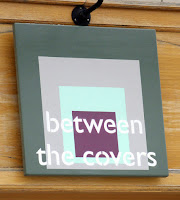 |
| Kate Bassett |
 |
| Alison DeCamp |
Kate interviewed Alison for this special feature. Enjoy!
What's unique about Between the Covers?
The owner, Katie Capaldi, is a bookseller. She's not a frustrated writer or a hobbyist, she LOVES books and loves finding the right book for every reader. She has created a store that feels curated--there are books we all love, books some of us love, books none of us love but we know a customer who will love it--all hand picked with people in mind.
How does this impact your role as a bookseller there?
It's a fun and exciting place to work because it's such a good feeling to pair a book and a reader.
What's it like to both write books and sell them? Writing books has ruined reading for me. Ha! Just kidding. Kind of. ;) Before becoming published it was a lot easier to simply read and enjoy a book. Now I'm constantly tearing a book apart to see how it works, thinking about techniques an author might use, and either wishing I had thought of an idea myself or baffled at how a book got published at all.
What are the most memorable author events you've experienced there...and why?
We had Andy Griffiths all the way from Australia as part of his U.S. tour and that was so fun. He's very professional, great with kids, and did not find me funny whatsoever. Regardless, it was fun having him and his publicist around for a couple of days.
What advice would you give authors before, during and after bookstore appearances?
I would first advise authors to create a relationship with a store (if possible) prior to asking for an event to be held. And, preferably, the bookstore asks you to come there rather than the other way around. Never, ever, ever act like you're doing the store a great favor by "letting" them sell your books/host an event/follow you around while you spill wine everywhere. During the event just be yourself. Also don't worry about the amount of people who may or may not show. I have found that even connecting with booksellers or a couple of attendees can be valuable--I've personally had events where two people showed up, but I got to know other authors or one of the people was a teacher or librarian. After an appearance it's always nice to get a thank you note, especially if the store has really gone all out.
What's the benefit of authors cultivating relationships with independent booksellers? Independent booksellers are an author's best friend. They know their customers, they know their books, and they know how to get the right book to the right reader. They also love to support authors they know and like.
As a successful middle grade author yourself, what's the best (and worst) advice you've been given when it comes to writing or publishing?
The best advice came from my editor, Phoebe Yeh. She keeps reminding me that when it comes to middle grade, it's more of a slow burn. I had it in my mind that everything was going to be fast and furious. It's not. And my agent, Sarah Davies, always reminds me (and all of her clients, to be honest) to not "over egg the pudding." I think of that all of the time while I'm writing. And over egging the pudding. I don't know that I got bad advice, but I do think it's a good idea to only do the things that work for you--if you're comfortable on Twitter/Facebook/Snapchat/Instagram/Periscope/Doohickey (<---I made that one up, but something should be named that), go for it! But don't be someone you're not.
Any bookstore events you are especially looking forward to?
We, of course, are peripherally involved in the Harbor Springs Festival of the Book which takes place at the end of September, beginning of October. Last year's event was so much better than I even thought it would be, I'm even more excited for this year. And while it's not technically a bookstore event, it involves books and authors and that's always fun.
 Thank you, Kate and Alison for sharing your insider's view! Please visit their author websites (Kate Bassett, Alison DeCamp) to learn more about their books, and like/follow the Between the Covers Facebook page to learn about their upcoming events.
Thank you, Kate and Alison for sharing your insider's view! Please visit their author websites (Kate Bassett, Alison DeCamp) to learn more about their books, and like/follow the Between the Covers Facebook page to learn about their upcoming events.Coming up on the Mitten Blog: Takeaways, photos, awards, and special honors from the annual SCBWI New York conference.
Have a great weekend!
Kristin Lenz













